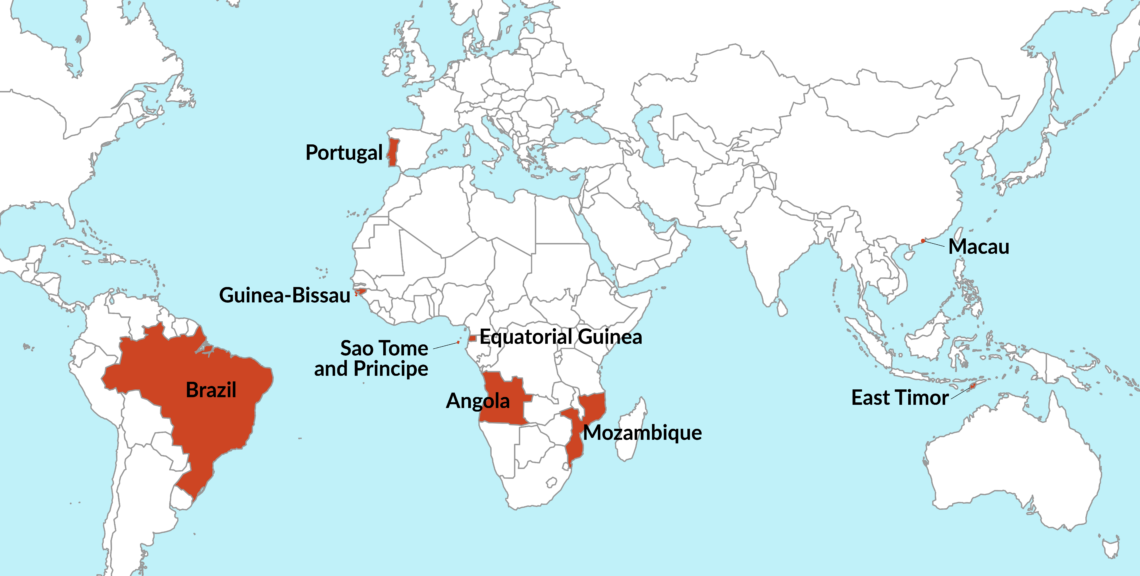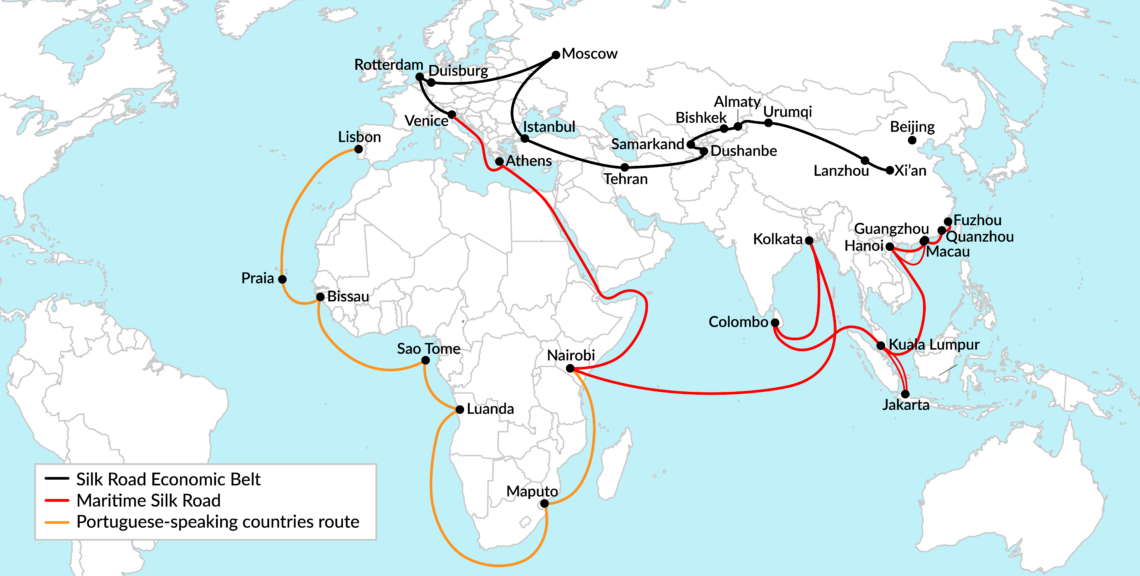Portugal is key to China’s Euro-African strategy
Like a white knight, China stepped in after Portugal’s 2011 bankruptcy with billions of dollars in investment. Now Chinese influence in Portugal is becoming a crucial cog in its strategy to exert influence and expand trade throughout Europe and Africa.

In a nutshell
- The Chinese influence in Portugal is strengthening
- China has boosted Portugal’s economy with huge investments
- Lisbon’s allies are wary of China’s intentions
In 2008, the global financial crisis hit Europe hard, with Portugal’s economy one of the worst affected. As turmoil in the eurozone grew, credit rating agencies downgraded Portugal’s debt to junk status. The country plunged into its most unfavorable economic period since the 1980s. In 2011, Portugal went bankrupt and became the third EU country to apply for financial assistance, following Greece and Ireland.
That year, the European Union, the Bank of Portugal (the country’s central bank) and the International Monetary Fund agreed on a 78 billion-euro bailout package that was conditioned on Portugal reducing public expenditure by implementing the biggest spending cuts in 50 years. Sweeping tax hikes were also put in place.
Attracting foreign investment was key to the much-needed economic recovery. Tax incentives and other measures meant to improve Portugal’s business environment were implemented. Unlike European partners and the United States, China took full advantage of the offer.
Facts & figures
Other major Chinese investments in Portugal
- China National Fisheries Corp: 5 million euros for a 51% stake in frozen seafood company Marfresco (2016)
- Shandong Taikai: 30 million euros for 30% in construction engineering firm Electricidade Industrial Portuguesa (2016)
- KNJ Investment: 15 million euros for 30% in Global Media Group (2017)
- EMGI Group: 300 million-euro investment in a real estate project in Lisbon (2019)
- CESL Asia: 37.5 million euros to acquire Monte do Pasto (2019)
Enter the dragon
Chinese interest took off as Portugal was receiving international financial assistance. Investors from China sought to capitalize on the wave of privatizations in the country between 2011 and 2012, buying significant stakes in strategic companies.
Most calculations rank Portugal in the top 10 Chinese investment destinations in Europe over the past decade.
The “Golden Visa” program, launched in October 2012, set the pace. Granting residence permits to foreigners who invest at least 350,000 euros in the country, the mechanism would soon turn Lisbon into the capital city of Chinese investment in Europe. More than 4,600 permanent visas have been awarded to Chinese citizens since 2012. Most of the requests were based on real estate purchases under the Golden Visa program.
Investment continued to pour in. Most calculations rank Portugal in the top 10 Chinese investment destinations in Europe over the past decade. Even more striking, some analyses based on per capita investment rank Portugal among the top five Chinese investment destinations, ahead of major European markets like Germany, the United Kingdom, Spain and Italy. The Chinese investment portfolio in Portugal ranges from energy to transportation, along with a significant presence in the health, insurance, construction, media and financial services sectors.
Energy
In 2011, the privatization process for Energias de Portugal (EDP) began. State-owned China Three Gorges Corporation (CTG) paid 2.7 billion euros 21.35 percent of the company. CTG continued to buy shares, up to 23.3 percent, and in late 2018 made a public tender for total control of EDP. That offer, however, was rejected by shareholders. Since then, CTG has sold off about 1.8 percent, leaving it with some 21.55 percent of EDP.
In 2012, State Grid Corporation of China bought 25 percent of National Energy Networks (Redes Energeticas Nacionais, REN) for more than 387 million euros, making it the company’s largest shareholder. In 2015, Hong Kong-based CK Infrastructure Holdings Limited (CKI) bought renewable energy firm Iberwind for 288 million euros. In August 2020, CKI announced it would divest itself of Iberwind.
Insurance
In May 2014, Chinese conglomerate Fosun International Limited bought 85 percent of Fidelidade (now Fidelidade Mundial), a Portuguese insurance company that is over 200 years old, for some 1.26 billion euros. The company also bought medical insurance provider Multicare for about 1 billion euros.
In June 2014, through Fidelidade, Fosun gained a 3.9 percent stake in REN, making the electrical grid company nearly 29-percent Chinese-owned. The move was highly controversial, since the sale put a foreign entity at the heart of Portugal’s energy distribution system.
Health and hospital management
Later that same year, Fosun bought private health group Espirito Santo Saude (later Grupo Luz Saude), for about 460 million euros. Luz Saude encompasses 18 health units, among them Hospital da Luz Lisboa, one of Portugal’s largest private hospitals.
By the end of 2014, Fosun accounted for nearly 41 percent of the 5.38 billion euros invested by Chinese companies since 2011. That made it by far the largest Chinese investment group in Portugal.
Banking and finance
In the aftermath of the collapse of Bank Espirito Santo in 2014, the financial institution’s investment arm, Bank Espirito Santo de Investimento (BESI), was sold to Haitong Securities, a Chinese financial services company, for 379 million euros. In 2016, Fosun would buy 16.7 percent of Millennium BCP for 175 million euros. By the end of 2019, Fosun’s share in the bank had reached 27.25 percent, making it the largest shareholder and giving it significant control over the company.
Construction
The most recent high-impact Chinese business move in Portugal came in August 2020. The state-owned China Communications Construction Company (CCCC), the fourth-largest construction and infrastructure group in the world, announced it would buy 30 percent of Mota-Engil for 750 million euros. Mota-Engil is Portugal’s largest construction company, with major operations in Latin America (Mexico, Colombia), Africa (Angola, Mozambique, Ivory Coast) and Europe.
Aviation
In 2016, China’s Hainan Airlines bought into the capital structure of TAP Air Portugal through a consortium called Atlantic Gateway. The Chinese firm divested its 9 percent stake in the Portuguese airline in 2019.
Chinese firms have also been buying up shares in Portuguese companies’ international operations. A case in point is Petrogal Brasil. In 2011, Chinese state-owned company Sinopec paid 5.2 billion euros for a 30 percent stake in the firm, the Brazilian unit of Portugal’s Galp. EDP has also sold stakes in several of its worldwide subsidiaries to China Three Gorges.
To date, overall Chinese investment in Portugal is estimated at 10-12 billion euros. Although a slowdown in Chinese investment began in 2018, Portugal will likely remain a key destination for capital from the Middle Kingdom, especially considering Beijing’s long-term interests in Europe and Africa.
Gateway to Europe
Despite pockets of resistance, currently exacerbated by the trade dispute between Beijing and Washington, Chinese investment in Europe and Africa is expected to thrive and diversify in decades ahead. In this context, Portugal stands at the heart of China’s strategy.
At a time when most EU member states sought to restrict Chinese influence, China saw Portugal as a gateway to Europe.
In December 2018, President Xi Jinping visited Portugal. It was the first visit by a Chinese head of state since President Hu Jintao’s in 2010 and was deemed the beginning of a new era in Sino-Portuguese relations. At a time when most EU member states sought to restrict Chinese influence, China saw Portugal as a gateway to Europe. Around 20 cooperation agreements were signed in areas ranging from culture to science, agribusiness and trade.
Portugal’s location on the Atlantic, at the crossroads of global maritime routes, makes it an attractive partner for China. Following President Xi’s visit, the two countries worked to develop a constructive relationship that would lead to a maritime extension of the Belt and Road Initiative (BRI). The move was another step toward closer ties.
Facts & figures

Since the end of the Cold War, the North Atlantic basin has seen little geopolitical activity. The U.S. uses the Lajes air base in the Azores less than it once did. The region offers tremendous opportunity for China.
Portugal has several important strategic assets. Among them are Portugal’s ports, particularly the deepwater Port of Sines. Sines could be a hub connecting the maritime and land routes of the BRI, working as the last stop in the sea route and the first station on the railway into Central Europe.
The Azores archipelago and Portugal’s exclusive economic zone (EEZ) are among the country’s other advantages. The EEZ, the EU’s third largest, could nearly double if a proposal to extend the Portuguese jurisdiction over the continental shelf is approved.
Another emerging opportunity stems from liquefied natural gas (LNG), which will likely become a crucial fuel for the shipping industry in the 21st century. Portugal’s location – especially the Azores and Madeira autonomous regions – can make maritime routes more efficient, especially when it comes to refueling LNG-powered ships. The port of Praia da Vitoria, on Terceira island in the Azores, for example, could be converted into a large LNG station.
Portugal’s extensive links with the African archipelago country of Cabo Verde is another advantage. Galp, the Portuguese energy firm, owns 48 percent of Cabo Verde’s national oil company, Enacol.
Portugal’s soft power
Among Western nations, Portugal has one of the longest relationships with China. Leaving aside the past 41 years of formal diplomatic ties, the two societies have been in contact for some 500 years. In 1999, the smooth handover of Macau – the last outpost of the former Portuguese Empire – added a layer of mutual trust.
In 2019, the Portuguese-speaking world accounted for 5 percent of China’s imports.
Apart from Portugal, the Portuguese-speaking world, encompassing seven other countries on three different continents, represents a market of almost 280 million consumers, a combined gross domestic product (GDP) of $1.96 trillion and $461 billion in trade flows. In 2019, the lusophone world accounted for only 1.6 percent of China’s world exports but also 5 percent of its total imports. The economic relationship is boosted through the Forum for Economic and Trade Co-operation between China and Portuguese-speaking Countries.
Peer pressure
Introduced in 2013, the BRI is a major infrastructure project through which China intends to strengthen its economic and trade relationships in Asia, Africa and Europe. Considered the centerpiece of Chinese President Xi Jinping’s foreign policy, the project has a deeper political agenda that has alarmed many in the Western world, especially given Beijing’s more assertive policies in Hong Kong, along the Himalayas, in Taiwan and in the South China Sea.
Portugal’s decision to integrate the BRI into its economic policy, as well as China’s involvement in key Portuguese companies, gives Beijing significant potential sway over the country’s economy. This Chinese influence on Portugal is a cause of concern for many of Portugal’s partners, especially in Europe – mainly Germany and France – but also the U.S.
However, in Portugal the risks of Chinese engagement are not yet part of the national political debate. China’s key role in Portugal’s economic recovery from 2011 onward could be an underlying factor, especially when contrasted with the lack of interest from European and American investors at the time.
Perhaps most importantly, the Chinese have been extremely cautious in their PR strategy when dealing with Portuguese stakeholders. There is no blatant interference in the daily management of the firms they acquire, even when major strategic decisions are subjected to Chinese scrutiny and approval.
Chinese firms also hired well-known politicians from major parties, a strategic move designed to provide legitimacy, maintain positive public relations and protect themselves from political meddling.
The Covid-19 pandemic and the U.S.-China trade dispute have emboldened critics, heightened pressure from the traditional allies of Portugal and raised suspicions among the populace about Chinese influence. Recently, U.S. Ambassador to Portugal George Glass said that Lisbon would have to chose between its economic partners and its traditional allies. His statements made clear that the U.S. would have difficulty trusting an ally that allows the Chinese to manage some of the country’s most important strategic assets. Lisbon will have to carefully weigh its priorities.








